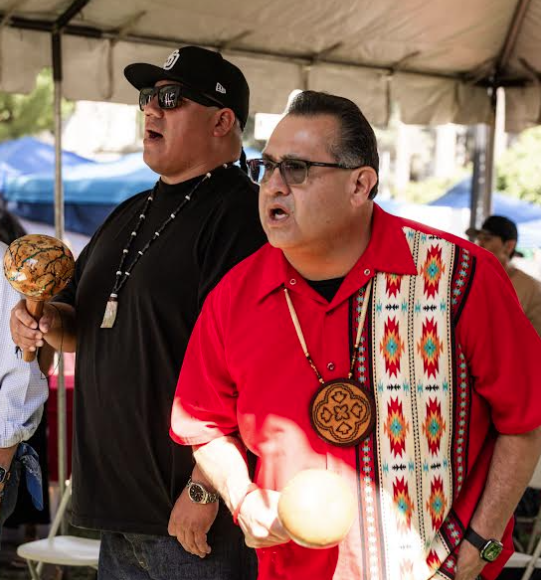California Assemblymember James C. Ramos celebrates on Native American Day on Friday, Sept. 26, 2025. (Photo/James C. Ramos Office)
On Friday, known as California Native American Day, Gov. Gavin Newsom signed three key pieces of legislation focused on Native American issues and issued a proclamation recognizing the significance of the day. The bills—authored by Assemblymember James C. Ramos (D-San Bernardino), the first and only California Native American elected to the Legislature since statehood—address tribal cultural expression, ancestral repatriation, and intertribal support.
The new laws aim to:
-
Protect Native students’ right to wear tribal regalia at graduation ceremonies,
-
Support proper reburial of Native American remains on CSU lands, and
-
Streamline funding from gaming tribes to tribes with limited or no gaming resources.
Ramos called the legislation a meaningful shift in state-tribal relations:
“I thank the governor for his signature on these bills that represent a turning of the page in how California writes its story with Native American tribes. Just acknowledging—once again—a student’s right to wear tribal regalia at high school graduation ceremonies is a far cry from early statehood when California’s first governor called for a ‘War of Extermination’ against the tribes.”
He also emphasized the importance of supporting ancestral respect and intertribal cooperation:
“We also look forward to working with the CSU system to craft a state policy paving the way to bring the remains of our ancestors a step closer to proper reburial. This would meet a decades-overdue obligation to repatriate Native American remains and funerary items wrongfully in possession of CSU campuses around the state,” Ramos continued. “It is painful to think of our ancestors’ remains stored in boxes on shelves instead of in the earth. We also hope streamlining grants funded by gaming tribes will help fellow tribes without the same resources. Gov. Newsom’s approval of these measures is welcome, particularly on a day when we celebrate the contributions of our state’s tribes, their diversity, resilience and culture.”
In his official statement, Gov. Newsom highlighted the broader goals of the legislation:
“This legislation builds on the efforts of the Newsom administration to examine and address historical wrongs and promote access and inclusion for California Native peoples. Earlier this year, the state released the Native American Studies Model Curriculum, developed in collaboration with California tribes, Native scholars, educators, and community leaders.”
The Three Bills
AB 1369 – Right to Wear Tribal Regalia at Graduation
This bill prohibits school districts from banning the wearing of tribal regalia during graduation ceremonies. It reinforces students’ cultural rights and responds to ongoing disputes in school districts across the state.
Clovis Unified School District 2025 graduate Bella Garcia said:
“California sits on the traditional homelands of all California Indian people, and it is important to recognize California tribes’ sovereignty. Tribes and their members are the best informed and most appropriate persons to determine what is or is not appropriate cultural regalia. I want to thank all who have made this bill a reality including Governor Newsom, Assemblymember Ramos and all who took the time to listen to tribal families and students. American Indian youth deserve to be recognized, celebrated and uplifted while honoring their ancestors who came before them. Graduation is one of the most momentous milestones for all students, especially for California Native Americans. It should be celebrated, not marred by misplaced and uninformed bureaucratic objections that prohibit cultural pride.”
AB 1369 is sponsored by California Indian Legal Services and the Tule River Indian Tribe. Supporters include several tribes, ACLU California Action, California Indian Nations College, and regional educational agencies.
AB 977 – Reburial of Native American Remains on CSU Lands
This legislation requires the California State University (CSU) system to work with tribes in developing policies that designate university land for the reburial of Native American remains. The measure builds upon federal and state repatriation laws—NAGPRA (1990) and CalNAGPRA (2001)—which direct public institutions to return Native remains and funerary objects to tribes.
Samantha Cypret (Mountain Maidu), executive director of the CSU Office of Tribal Relations, said:
“The California State University is committed to addressing the painful legacy of Native ancestors and cultural items held within our system. AB 977 represents an important step in fulfilling our responsibility to work in true partnership with Tribal Nations to ensure their ancestors and cultural belongings are laid to rest with dignity and respect. We are deeply appreciative for Assemblymember Ramos’ leadership and look forward to working closely with Native voices across California as we move this work forward.”
AB 977 is sponsored by the Santa Rosa Rancheria Tachi Yokuts Tribe, with support from the Morongo Band of Mission Indians, the Society for California Archaeology, the California Faculty Association, and others.
AB 221 – Streamlining Intertribal Grant Funding
AB 221 simplifies the process by which tribes with gaming operations can provide financial support to tribes with little or no gaming revenue. The bill modifies the Tribal Nation Grant Fund, allowing for equal annual grant disbursements of at least $600,000—or 85% of the fund, whichever is greater—upon application.
These grants may fund tribal housing, water infrastructure, vocational programs, and other priorities.
AB 221 is sponsored by the Tribal Alliance of Sovereign Indian Nations and the California Nations Indian Gaming Association. It is also backed by a broad coalition including individual tribes, the California Chamber of Commerce, and the California Democratic Party Rural Caucus.
Additional Wins for California Tribes
The 2025–26 state budget includes:
-
$5 million for a three-year pilot program granting tribal law enforcement officers peace officer status. The program aims to improve safety on tribal lands and address the Missing and Murdered Indigenous People (MMIP) crisis—California currently ranks fifth in the nation for unresolved MMIP cases. The Department of Justice will oversee the project.
-
$10 million for California Indian Nations College, supporting its path to becoming the first fully accredited tribal college in the state. Despite having the largest Native American population in the U.S., California currently lacks a federally accredited tribal college.
About the Author: “Levi \”Calm Before the Storm\” Rickert (Prairie Band Potawatomi Nation) is the founder, publisher and editor of Native News Online. Rickert was awarded Best Column 2021 Native Media Award for the print\/online category by the Native American Journalists Association. He serves on the advisory board of the Multicultural Media Correspondents Association. He can be reached at levi@nativenewsonline.net.”
Contact: levi@nativenewsonline.net









